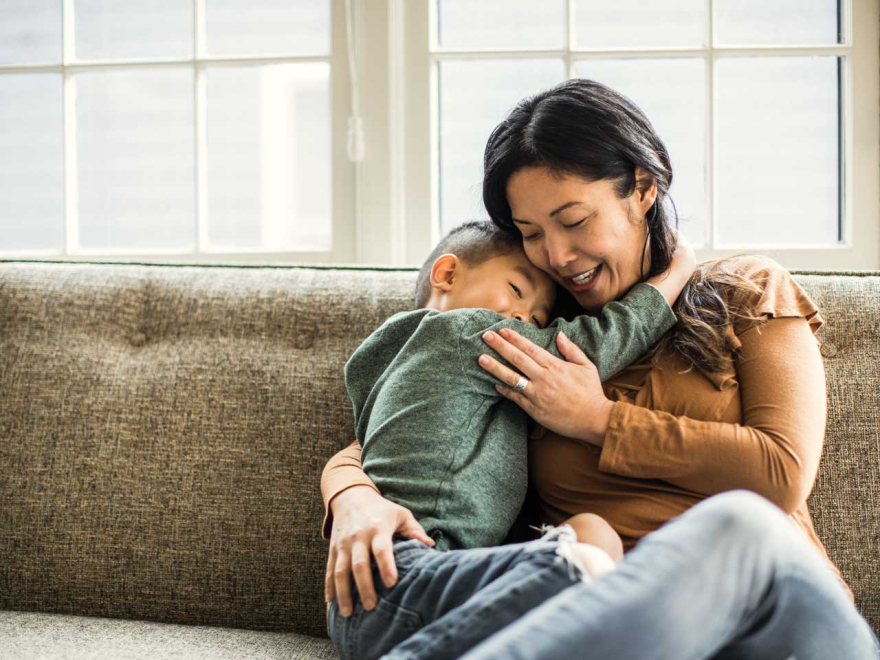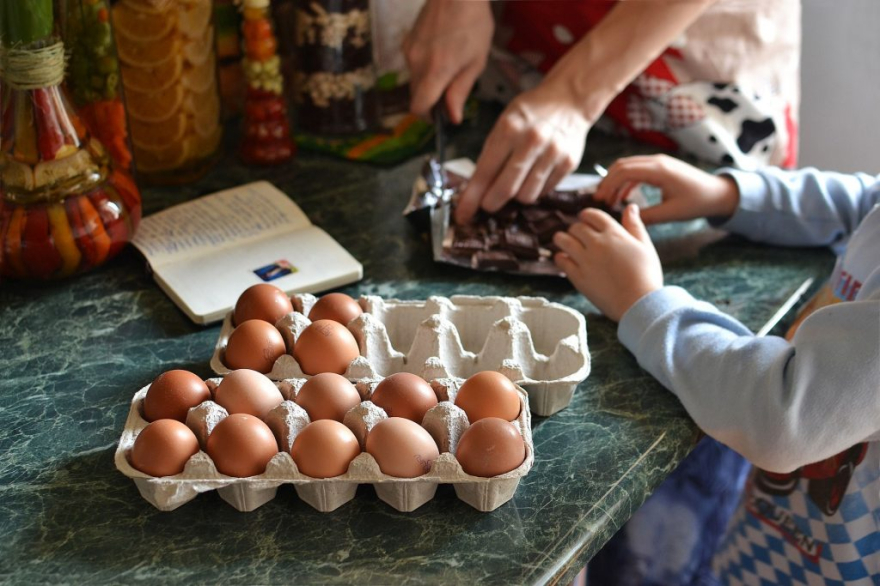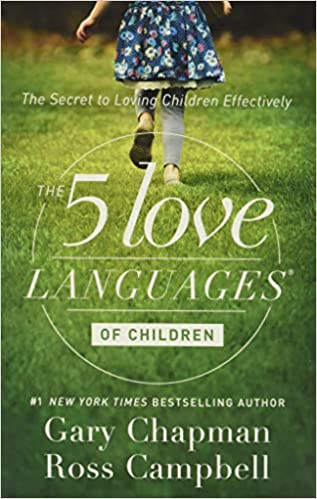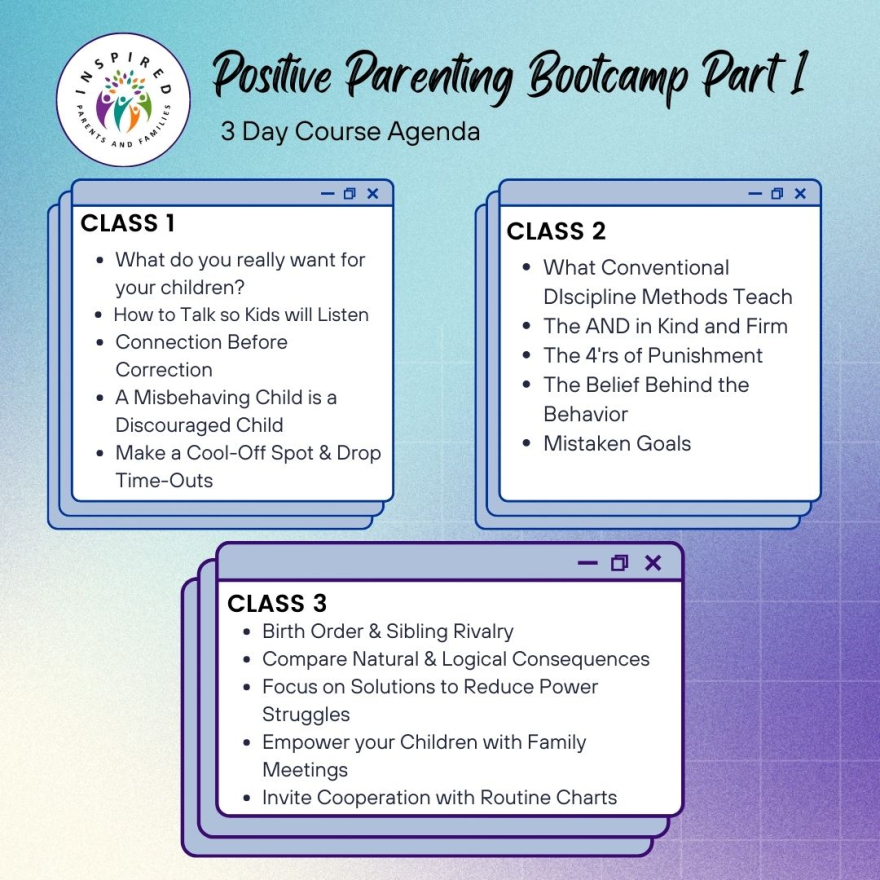Children express and experience love in different ways. For example, one of my sons prefers physical touch, whereas the other needs words of affirmation. Each of these expressions of love represents a different "language".
Learning the love languages of my boys has had a profound impact on my relationship and connection with them. It has also helped them feel unconditionally loved, accepted, heard, and understood.
Gary Chapman and Dr. Ross Campbell introduced the concept of love languages in the book The Five Love Languages and later in The Five Love Languages of Children. They said some people love through physical touch, others through words of affirmation, acts of service, gifts, or quality time.
It’s common to have different love languages within a family and it can be tricky to navigate. However, once you do learn your child’s love language, it can make all the difference in your relationship and their happiness.
 1. Physical Touch
1. Physical Touch
For children who have this as their primary love language, physical touch communicates love to them more deeply than giving them praise, buying a gift, or fixing a toy.
Without hugs, kisses, pats on the back, and other physical expressions of love, their love tanks will remain less than full.
Some ways to express love via physical touch include
- sitting near or beside a child (for example, if you’re reading a story together, you can sit side by side or have your child sitting on your lap)
- for smaller kids, giving lots of kisses and hugs, being seated on a parent’s lap
- for older kids, also add a pat on the back, holding hands, a high-five, or an arm around their shoulder
- occasionally yelling “group hug” for your entire family and for more fun, including your pets!
- playing games like Twister
- playing This Little Piggy, Pat-a-Cake, tag, piggyback rides, and airplane
- creating a “spa night” and doing manicures, pedicures, and shoulder massages
- making up hand-shakes
- gently squeezing their hands to say “I love you!”
- snuggling close on the couch and reading together
 2. Words of Affirmation
2. Words of Affirmation
Words are powerful in communicating love. Words of affection and endearment, words of praise and encouragement, words that give positive guidance all say, “I care about you”. These words nurture a child’s inner sense of worth and security.
Even though such words are quickly said, they are not easily or soon forgotten and a child reaps the benefits of affirming words for a lifetime. A child who tells you what they like and often seeks compliments feels loved through words of affirmation.
Refrain from using harsh critical words as they really affect a child whose primary love language is a word of affirmation.
They feel special when you tell them you appreciate them by
- using encouraging words and phrases often
- saying “I love you” many times a day
- saying “I love to watch you…" (play, draw, sing, help, etc.)
- affirming both their efforts and achievements
- creating a name of affection for your child that is only used between the two of you
- when a child makes a mistake, acknowledging their good intentions, effort, determination, etc.
- painting rocks with encouraging sayings
- writing little love notes and leaving them around the house or in their lunchbox.
 3. Quality Time
3. Quality Time
Quality time means focusing your attention on your child. It is the gift of being present and telling a child, “you are important and I like spending time with you”. The child feels loved because the parent or carer is choosing to spend time alone with them.
When you spend time with your child or children, you will best serve their needs by adapting to their physical and/or emotional level of development.
What you do with your child is less important than the actual time you spend together. When a child requests one-on-one time with a parent, whether it be through play, outdoor activities, or just chatting, they are communicating their need to feel love. It is important to follow-up and focus on their needs.
Some ways to demonstrate quality time include
- allocating a special time for your child to just be there and listen to their stories and feelings
- bringing your child along during errands
- looking at the stars together
- drawing or journaling together
- allowing them to help you around the house
- taking walks together and having conversations (call it “twalks” to make it fun)
- stopping what you are doing and making eye contact with your child when they tell you something
- finding silly things to laugh about together
- doing fun activities and playing games together
 4. Gifts
4. Gifts
The giving and receiving of gifts can be a powerful expression of love and for some, can remain meaningful even later in their lives. The most thoughtful gifts can become true symbols of love.
A child who often gives you something small, like a toy wrapped in paper or flowers from the garden, tends to feel loved through gifts. These gifts can be given together with any of the other love languages.
However, there is a difference between a child who sees gifts as an extension of your love and a child who begs and whines for a toy every time you go shopping. A child, whose love language is receiving gifts, will be happy with the smallest token or even something handmade.
Some ideas for tangible things as an expression of love include
- choosing small, inexpensive tokens, thoughtful gifts, or homemade presents. This will mean a lot to your child during ordinary days and more special occasions
- choosing gifts that fit the interests of your child.
- making a collection of unique gift boxes and wrapping paper (choose their favorite colors) that can be used for even the simplest gifts
- gifting your child a song, either one you create or a special song that reminds you of them
- keeping a chart and some stickers to record achievements and rewarding your child with a gift
- creating a photo album or book about them and some special moments you've shared
- buying a new shirt that captures their personality
- making them a special treat or their favorite meal
- gathering hand-picked flowers or anything from nature that your child would find special
- framing a special photograph of the child doing something they love
 5. Acts of Service
5. Acts of Service
When your child asks you to fix a toy or would like to repair something of yours, sometimes it isn’t about getting the task done but rather a need for extra love and attention.
If your child’s primary love language is acts of service, you don’t need to jump at every request. However, it is important to be sensitive to these special requests and understand how your response will either fill your child’s love bucket or empty it. Each request calls for a thoughtful loving response.
Acts of service can include
- for younger children, instead of telling them to go to bed, carrying them to bed and tucking them in
- making them a special treat or their favorite meal
- making them a drink and bringing it to them
- when running late for an appointment, help your child quickly finish what they are doing so you can both be ready faster, rather than just telling them to hurry
- making a list of your child’s favorite things to do with you and do one of these things periodically when they least expect it
- doing a chore they would normally do (e.g., cleaning the playroom, making their bed)
- brushing their hair
- organizing/cleaning their closet or drawers
- checking out library books you know they would like
- sitting down to do their homework together
- giving your child a surprise room makeover
The purpose of learning to speak your child’s love language is for you to connect more deeply with your child. This can build their self-worth, which is key for lifelong self-love and confidence and applies to all ages and stages of development, too.
Building an understanding of your own love language and recognizing it may be different to not only that of your child but also your partner is a powerful tool for building beautiful strong family bonds and relationships based on unconditional love and understanding that will last a lifetime.




 1. Observe how your child expresses his love to you. (Best used for children age 5 to 10 years old)
1. Observe how your child expresses his love to you. (Best used for children age 5 to 10 years old) 3. Listen to what your child requests most often.
3. Listen to what your child requests most often. What are the benefits of speaking your child’s love language?
What are the benefits of speaking your child’s love language?



 Parents and caregivers will learn long term solutions for raising kids to feel “I am capable, I can contribute, and I can use my personal power in useful ways to improve my life and the lives of others!” Positive Discipline teaches long term parenting skills that will encourage children to think for themselves, become more responsible and have a greater respect for themselves and others. Feel supported while learning some non-punitive, respectful methods that will incorporate kindness and firmness into your relationship with your children. Get to the core of your children's misbehavior, practice encouraging tools and gain a sense of accomplishment.
Parents and caregivers will learn long term solutions for raising kids to feel “I am capable, I can contribute, and I can use my personal power in useful ways to improve my life and the lives of others!” Positive Discipline teaches long term parenting skills that will encourage children to think for themselves, become more responsible and have a greater respect for themselves and others. Feel supported while learning some non-punitive, respectful methods that will incorporate kindness and firmness into your relationship with your children. Get to the core of your children's misbehavior, practice encouraging tools and gain a sense of accomplishment.
 Parent coaching is designed to provide insight, help parents discover newfound energy in their parenting, develop an appreciation for what they have and who they are, and create sustainable ways to achieve their vision or dream for their family. Different than therapy, coaching’s unique methodology allows the coach to provide support as a cheerleader, guide, and mirror. Coaching is perfect for helping parents who are feeling overwhelmed, parents who are baffled by their children’s behavior, parents who are looking to bolster their parenting “tool box,” and parents who simply want to take their family’s life from good to great. Interested to see if Coaching would be a good fit for your family? Click below to schedule a complimentary discovery call.
Parent coaching is designed to provide insight, help parents discover newfound energy in their parenting, develop an appreciation for what they have and who they are, and create sustainable ways to achieve their vision or dream for their family. Different than therapy, coaching’s unique methodology allows the coach to provide support as a cheerleader, guide, and mirror. Coaching is perfect for helping parents who are feeling overwhelmed, parents who are baffled by their children’s behavior, parents who are looking to bolster their parenting “tool box,” and parents who simply want to take their family’s life from good to great. Interested to see if Coaching would be a good fit for your family? Click below to schedule a complimentary discovery call.